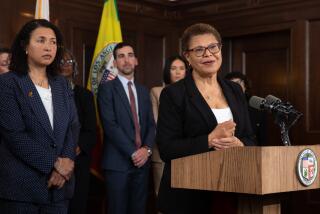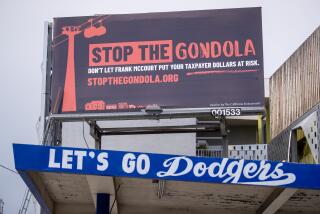Can L.A. find a way to create local jobs from local transit projects?
Los Angeles County has embarked on a major public works project: the Crenshaw light-rail line, a multibillion-dollar investment in public transit construction that will dramatically change the area’s transportation landscape. But will it change the local economic landscape as well?
Residents who live along the new line are hoping it will. They’ve held rallies and workshops in recent months urging the Metropolitan Transportation Authority to give the men and women in the neighborhood a shot at what has been a rarity in South Los Angeles — a good-paying union job that can be the entry into a carpentry, landscaping or other construction industry career.
But Metro officials say federal transportation law prohibits the agency from steering jobs to local residents if the project receives federal funds. The agency can — and has — required contractors to hire 40% of workers from low-income areas. But because of the prohibition, those workers may come from any impoverished ZIP Code in the nation.
The ban on targeted geographical hiring may have made sense in the past, when the federal government covered 80% of the cost of major transportation projects. The argument was that if taxpayers nationwide paid for the project, workers nationwide should have a chance at being hired to build it. But the funding model has changed, particularly in Los Angeles. Since the Measure R half-cent sales tax increase passed in 2008, the county has committed to paying most of the cost of big transportation projects.
Take the Crenshaw line, which is expected to begin construction this year. Measure R and other local money will cover 53% of the upfront $2.05-billion cost. The federal government paid 6% and loaned Metro 26% of the cost, which will be paid back from Measure R revenue. County taxpayers will ultimately pay nearly 80% of the cost.
Rep. Karen Bass (D-Los Angeles) has introduced the Local Hire Act, which would change federal transportation law to give state and local agencies the ability to include geographical hiring targets in bid specifications for highway and public transportation projects, even if they receive federal funding. Her office notes that several federal agencies allow preferential treatment for local businesses and workers. The Department of Housing and Urban Development even requires that recipients of housing and community development funds first try to hire people who live in public housing and then target workers in the surrounding areas.
Major transit projects can stimulate significant economic activity in a community. Being able to set aside a percentage of the work for local hires is both a goodwill gesture for the disruption that comes with years of construction and a way to address chronic unemployment in impoverished areas. Bass’ bill deserves support.
More to Read
A cure for the common opinion
Get thought-provoking perspectives with our weekly newsletter.
You may occasionally receive promotional content from the Los Angeles Times.






